英语Unit5《Thepowerofnature》教案(6)(新人教版选修6)
- 格式:doc
- 大小:102.49 KB
- 文档页数:7
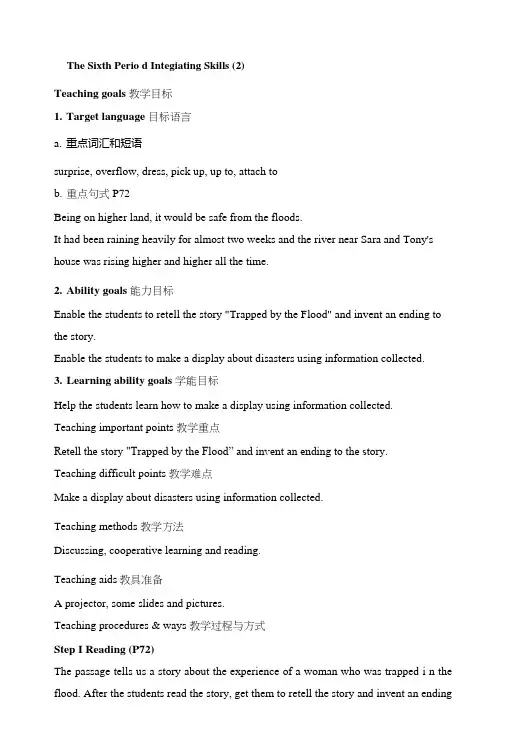
The Sixth Perio d Integiating Skills (2)Teaching goals 教学目标1.Target language 目标语言a.重点词汇和短语surprise, overflow, dress, pick up, up to, attach tob.重点句式P72Being on higher land, it would be safe from the floods.It had been raining heavily for almost two weeks and the river near Sara and Tony's house was rising higher and higher all the time.2.Ability goals 能力目标Enable the students to retell the story "Trapped by the Flood" and invent an ending to the story.Enable the students to make a display about disasters using information collected.3.Learning ability goals 学能目标Help the students learn how to make a display using information collected.Teaching important points 教学重点Retell the story "Trapped by the Flood” and invent an ending to the story.Teaching difficult points 教学难点Make a display about disasters using information collected.Teaching methods 教学方法Discussing, cooperative learning and reading.Teaching aids教具准备A projector, some slides and pictures.Teaching procedures & ways 教学过程与方式Step I Reading (P72)The passage tells us a story about the experience of a woman who was trapped i n the flood. After the students read the story, get them to retell the story and invent an endingto the story.T: Look at the two pictures on .page 73. What is happening?SI: A woman was trying to escape from a flood. She was climbing up to the roof with her baby on her back. She also took her cat and dog along. It/s still raining heavily. The water level had risen to the window. Sitting on the roof, she put on the raincoat and waited for rescue.T: Now let's read the text and find what happened to the woman.After reading.T: Was Sara rescued? The story still needs an ending. Suppose you are Sara and imagine what happened at last. Then retell the story to your partners.A sample version:Trapped by the FloodYou cannot imagine the terrible day. It had been raining for two weeks. The river near our house was rising higher and higher all the time. Tony, my husband, and others from the village had spent the last two days putting sandbags along the side of the river to stop it overflowing. Finally they feared that their hard work had been useless and soon the whole village would flood. He rang me immediately and asked me to go to my mother^ place, which was on higher place and would be safe from the flood・ I was preparing for a nice dinner. The next day was my husbands birthday. I wanted to cook him a nice meal and surprise him with the new mountain bike Fd bought for him I was a little disappointed, but I followed his advice. I dressed baby James in warm clothes and collected the things I would need over the next few days. I put the lead on the dog, Rosie, went to search for the cat, Monty. It took me a long time to look for it. At last, I found him under the covers on my bed. As I was reaching for the car keys, I heard a sound. I looked at the back door and saw the water flowing in underneath. Attaching baby to my back, I ran to the front of the house and out into the front garden with Rosie and Monty. It seemed that the water would soon be much deeper, I ran to the car, climbed first onto the front of the car and then onto the roof. Sitting on the roof, I found the water rushing past the car, was already half way up the doors and still rising. I put on the raincoat to protect my baby from the rain. Luckily, I found my mobile phone inmy pocket. I dialed my mother, but I couldn^t get through. Telephone poles must have been brought down by fallen trees. u What should I do?" Waiting on the roof anxiously, I looked around, hoping to find a boat to save us. Suddenly, I heard someone calling me. " Where are you?” I shouted. u Here. In the tree." I looked towards the trees. Mr White was in the tree. The water was rushing under him.“Catch the tree tightly.” I shouted. u Don't worry! They will come to save us.” We encouraged each othe匚Half an hour past, the rain stopped. The baby cried hungrily. Rosie and Monty lay silently. "Why don^t they come to save us? What happened? They will find us soon/' 1 had to force myself not to panic. Just then I heard my husband calling me. “We are here, on the roof.v I waved happily. We were saved at las 匸I was relieved when we finally reached a safe place.Step II Listening (P73Get the students to listen to the material and make a timeline of Sara's story.T: We are going to listen to Sara telling her mother about her experience. Is the ending the same as the ending that you invented? Listen and make notes about the main events in the story. Then make a timeline according to your notes.The students listen and make notes. After they complete their timeline, check their answers in class.Step III ProjectT: Share your information, pictures and diagramswith others and get into a group with those who are interested in the same kind of disaste匚Then decide how to make your display and who is going to do what.After the students finish, ask two groups to present their work in class.A sample version:Mud-rock FlowFirst, I will show what causes mud-rock flow. Take Yuyang, a county in Yunnan, for example.The old Yuyang County is located in an ancient landslide 223.7 km from the dam site, which has been divided into eastern and western parts. The eastern town slide is less than 190 meters in height and the volume is 400x104x3. The western town slide is lessthan 350 meters in height and has a volume of 2500x104x3. The slide mass consists of silty clay with calcareous nodules, silty clay intermingled with rock detritus and disintegrated rocks, with depth of 44m. The silty clay intermingled with rock detritus and the disintegrated rocks formed the sliding surface with a depth of 0.63-6.6m> The front of the slide is near the river.Many deformations occurred in different places since 1982 and surface drainage and consolidation measures were applied by local government. On the morning of January 17 in 2001, the collapse and landslide occurred, with a total volume of over 5x104x3. Rock masses with soil sided along the slope, cumulating over the slope 500m high. A small quantity of large rock masses broke its way into the town and caused harm to the residential areas. A hazardous rock mass of 2-3 X 104X3 remained on the top of the slope. The collapse masses and hazardous rock mass are in an unstable state. On April 19, part of the collapse masses fell off. On July 12 and 1& triggered by the rainfall, the collapse masses slide twice and intruded the town area in the form of mud-rock flow, endangering the residents and the buildings.Sometimes, the mud-rock flow was caused by continuous, heavy rainfall from Typhoon. The following is an actual event that happened in China.At least 11 people have been killed and 34 are missing in a rare mud-rock flow brought by floods in two counties of southwest China^s Yunnan Province. Six people were seriously injured and 360 more people were stranded in the flood and mud-rock flow, with 2,100 houses toppled and over 1,000 heads of cattle killed.The government and peopl e help them immediately.The Yunnan Provincial Civil Affairs Department has quickly transported quilts and clothes to the two counties, and over 3,900 people have been removed from the disaster-hit areas.The Yueqing municipal government has al located 30 million yuan (US$3.6 million) of relief fund and aroused more than 300 people to search for the missing villagers and restore infrastructure.Each victim^ family received an 20,000 yuan (US$2,400) allowance from the government, said Mayor Huang Zhengqiang.The government also allocated rice, pork, salt, vegetables and mineral water to the villagers, as the catastrophe cut off water and food supplies.The government has taken some measures to lessen the damage.The municipal government plans to relocate several of the villages to safer locations before February 2005・ Meanwhile, the government has solicited donations from local enterprises and asked the villagers to help themselves and resume production at an earlier date.Step IV HomeworkT: Do SUMMING UP and CHECKING YOURSELF to check how well you have mastered this unit. So much for this unit. See you next time.附件FLOODS AND DAMSLife Givers, Life TakersThey bring both death and the promise of renewed life, often on the same rushing tide. Floods can cause untold misery. More than 3,000 people were killed and 14 million were homeless in China during the summer of 1998. The cause: the heaviest flooding of China's Yangtze and other rivers since 1954. In 1931 almost four million died along China^s Huanghe, or Yellow River, when it surged over its banks. Heavy summer rains in the U.S. Midwest swelled the Mississippi, Missouri, and several other rivers in 1993, destroying entire towns and covering millions of acres of farmland.But when rivers overflow their banks due to melting snow or torrential rains, floods enrich surrounding land, leaving behind organic material and minerals in the sand, silt, and debris. Ancient Egyptians planned their planting and their lives around the summer flooding of the Nile, which leaves a thin, even coating of black mud along either side when it recedes, leaving the soil so enriched that fertilizer is unnecessary. Flash floods, which rise and fall rapidly with little or no warning, and tsunamis-seismic waves caused by undersea earthquakes and volcanoes 一also drown people and livestock and destroy their habitations, as does flooding due to rains associated with hurricanes.EARTHQUAKESSunday SuipriseMany were caught inside churches that fair Sunday morning. What began as a gentle trembling of the ground quickly grew strong enough to shake buildings. One witness likened the sound coming from the Earth to the rumble of faraway thunder.It was just a foreshock. In the next moment the Reverend Charles Davy was "instantly stunned with a most hoirid crash, as if every edifice in the city had tumbled down at once/' Davy said another survivor recalled seeing "the whole city waving backwards and forwards, like the sea when the wind first begins to rise. ” In all there were three major earthquakes, several tsunamis, and a conflagration that consumed most of the Portuguese city of Lisbon on November 1, 1755-AII Saints5Day. Some estimates put the death toll at over 60,000.Over the millennia earthquakes have killed countless people and tossed their structures about like toys. About 35 earthquakes are observed around the globe every day, and about 18 major ones per yearThey can happen anywhere. A series of quakes near the town of New Madrid, Missouri, during the winter of 1811・ 1812 was felt as far north as Canada, as far south as the Gulf of Mexico, and rattled chinaware in Washington, D.C. Because the U.S. Midwest was so sparsely populated, the death toll was light. Today New Madrid lies within 150 miles (240 kilometers) of two major metropolises: St. Louis, Missouri, and Memphis, Tennessee; and 325 miles (520 kilometers) from Kansas City, Missouri.When a Midwest earthquake happens again, as experts say it surely will, the toll in human life and property destruction is expected to be ghastly.。
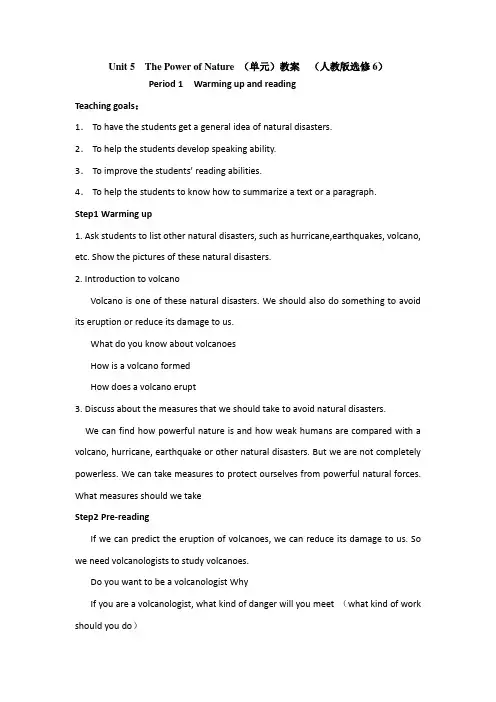
Unit 5 The Power of Nature (单元)教案(人教版选修6)Period 1 Warming up and readingTeaching goals:1.To have the students get a general idea of natural disasters.2.To help the students develop speaking ability.3.To improve the students’ reading abilities.4.To help the students to know how to summarize a text or a paragraph.Step1 Warming up1. Ask students to list other natural disasters, such as hurricane,earthquakes, volcano, etc. Show the pictures of these natural disasters.2. Introduction to volcanoVolcano is one of these natural disasters. We should also do something to avoid its eruption or reduce its damage to us.What do you know about volcanoesHow is a volcano formedHow does a volcano erupt3. Discuss about the measures that we should take to avoid natural disasters.We can find how powerful nature is and how weak humans are compared with a volcano, hurricane, earthquake or other natural disasters. But we are not completely powerless. We can take measures to protect ourselves from powerful natural forces. What measures should we takeStep2 Pre-readingIf we can predict the eruption of volcanoes, we can reduce its damage to us. So we need volcanologists to study volcanoes.Do you want to be a volcanologist WhyIf you are a volcanologist, what kind of danger will you meet (what kind of work should you do)Let’s learn something about volcanologists in the text.Step 3 Skimming1. Read through the passage quickly and find out the answers to the questions. What kind of things should a volcanologist doWhat is the volcanologist wearing when getting close to the crater2. Divide the passage into several parts and find out the main idea of each part. Step 4 ScanningScan the passage .Read the passage carefully and answer the following questions.1.Why is a volcanologist’s job important2.Where is Mount Kilauea3.Why is the lava that flows on Mount Kilauea more dangerous than the actualeruption4.What caused the writer’s bedroom to become as bright as day even though it wasnight5.Why did the scientists have to get close to the volcano after it began erupting6.Why was it difficult for the writer to walk towards the edge of the crater7.What does the writer find impressive about volcanoes even after studying themfor 20 yearsStep 5 DiscussionT1 Do you think it is an occupation you would enjoy Discuss your reasons with your classmates.T2 InterviewMake up an interview. Four students as a group. One student acts as the writer of the passage. The other three students act as the journalists from three different TV stations.Step 6 Homework:Spend some time researching one disaster. You can use books, magazines, newspapersor the Internet. Collect pictures and diagram and look for information about:• what causes this kind of disaster• actual events that h appened in the past in china and/or the rest of the world • how people helped the victims• what is being done to prevent the disaster happening again or to lessen the damagePeriod 2 Learning about LanguageTeaching goals:1.To help the students to learn how to use words and expressions.2.To review the V-ing form and learn the perfect V-ing form.Step 1 Discover useful words and expressions1.Show the video of an episode of Vesuvius eruption and ask students to fill in thetext with proper words.The eruption of Mount Vesuvius in 79AD took people in Pompeii by surprise. It was so quick and so severe that the town was soon covered in ________ and ________. Many houses in the town were ________. It was an ________ disaster for many people who could not get away in time. A writer named Pliny, who was there during the _______, described how lava was thrown into the air like a ________. ________ many of the townspeople, ________ at the ________ sight of Vesuvius eruption, stayed too long and failed to escape in time.2.Find suitable words or expressions from the texts in the unit to fill in the blankson page35.Step2 Grammar1.Show a flash to review the differences between V-ing and the past participle.a.现在分词表示主动,过去分词表示被动。
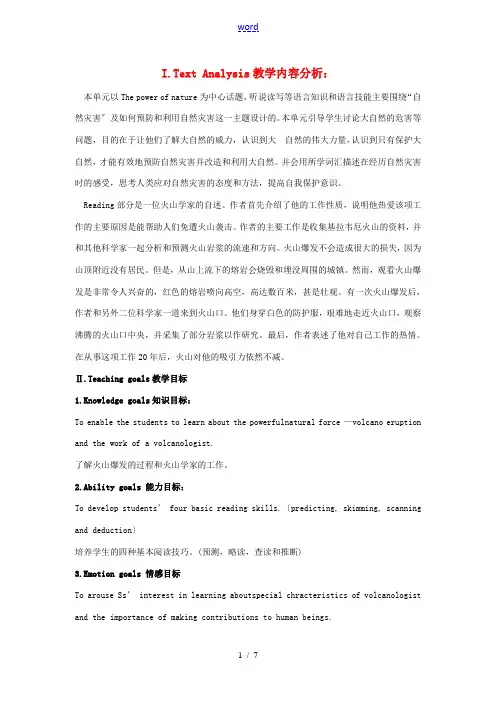
I.Text Analysis教学内容分析:本单元以The power of nature为中心话题,听说读写等语言知识和语言技能主要围绕“自然灾害〞及如何预防和利用自然灾害这一主题设计的。
本单元引导学生讨论大自然的危害等问题,目的在于让他们了解大自然的威力,认识到大自然的伟大力量,认识到只有保护大自然,才能有效地预防自然灾害并改造和利用大自然。
并会用所学词汇描述在经历自然灾害时的感受,思考人类应对自然灾害的态度和方法,提高自我保护意识。
Reading部分是一位火山学家的自述。
作者首先介绍了他的工作性质,说明他热爱该项工作的主要原因是能帮助人们免遭火山袭击。
作者的主要工作是收集基拉韦厄火山的资料,并和其他科学家一起分析和预测火山岩浆的流速和方向。
火山爆发不会造成很大的损失,因为山顶附近没有居民。
但是,从山上流下的熔岩会烧毁和埋没周围的城镇。
然而,观看火山爆发是非常令人兴奋的,红色的熔岩喷向高空,高达数百米,甚是壮观。
有一次火山爆发后,作者和另外二位科学家一道来到火山口。
他们身穿白色的防护服,艰难地走近火山口,观察沸腾的火山口中央,并采集了部分岩浆以作研究。
最后,作者表述了他对自己工作的热情。
在从事这项工作20年后,火山对他的吸引力依然不减。
Ⅱ.Teaching goals教学目标1.Knowledge goals知识目标:To enable the students to learn about the powerfulnatural force —volcano eruption and the work of a volcanologist.了解火山爆发的过程和火山学家的工作。
2.Ability goals 能力目标:To develop students’ four basic reading skills.〔predicting, skimming, scanning and deduction〕培养学生的四种基本阅读技巧。
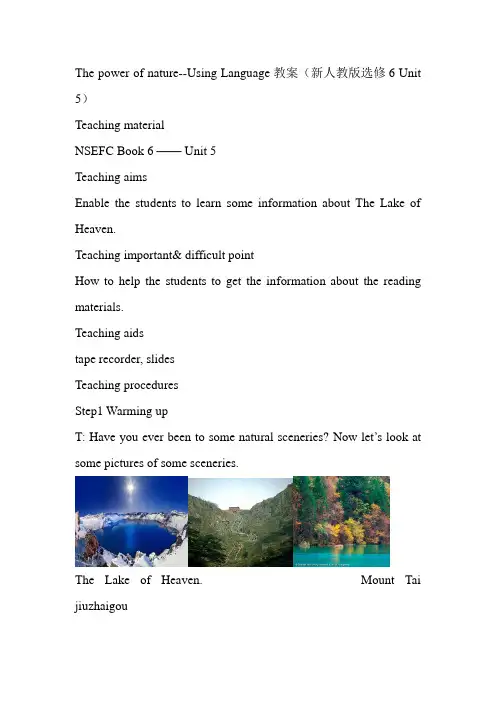
The power of nature--Using Language教案(新人教版选修6 Unit 5)Teaching materialNSEFC Book 6 —— Unit 5Teaching aimsEnable the students to learn some information about The Lake of Heaven.Teaching important& difficult pointHow to help the students to get the information about the reading materials.Teaching aidstape recorder, slidesTeaching proceduresStep1 Warming upT: Have you ever been to some natural sceneries? Now let’s look at some pictures of some sceneries.The Lake of Heaven. Mount Tai jiuzhaigouMount Huang fuxianhu the west lakeStep 2 Fast readingRead the text quickly and find out the key words(关键词)of each paragraph.Paragraph 1 ChangbaishanParagraph 2 TianchiParagraph 3 storiesParagraph 4 coinStep 3 Careful ReadingRead the passage carefully and finish the following tasks. Paragraph 1 ChangbaishanParagraph 2 TianchiParagraph 3 Fill in the blanks with some persons or animals to complete the chart.Three young women bathingfrom heaven a birdflewThe Manchupeopledropped father fruitA handsome gave birth toboy swallowed The youngest girlpregnantParagraph 4 coinYou and your ______ one drop a ____ into the clear, blue water to ________ your love will be as _____ and _______ as the lake. Keys: loved; coin; guarantee; deep; lastingStep 4 Detailed reading1. In what province is Changbaishan?In Jilin Province.What is a nature reserve? Why is Changbaishan a famous nature reserve?A place kept in its natural state for people to enjoy. The largest one in China.What is the most popular tourist attraction in the reserve? Tianchi, or the Lake of Heaven.4. What does Tianchi mean? How is Tianchi formed?The Lake of Heaven. In the crater of a dead volcano.5. What is the connection between the Manchu people and Tianchi? The story of the father of Manchu people.Step 5 DiscussionIf you were a tourist guide(导游), how would you introduce the Lake of Heaven in Changbaishan to the tourists?ChangbaishanTianchistorycoinThe Lake of Heavenin its four seasonsSpring summer autumn winterStep 6 HomeworkSurf the Internet to find more information about the Lake of Heaven.。
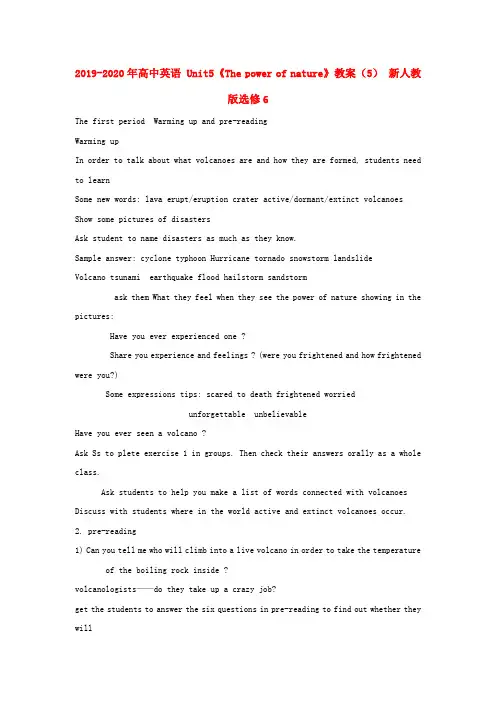
2019-2020年高中英语 Unit5《The power of nature》教案(5)新人教版选修6The first period Warming up and pre-readingWarming upIn order to talk about what volcanoes are and how they are formed, students need to learnSome new words: lava erupt/eruption crater active/dormant/extinct volcanoes Show some pictures of disastersAsk student to name disasters as much as they know.Sample answer: cyclone typhoon Hurricane tornado snowstorm landslideVolcano tsunami earthquake flood hailstorm sandstormask them What they feel when they see the power of nature showing in the pictures:Have you ever experienced one ?Share you experience and feelings ? (were you frightened and how frightened were you?)Some expressions tips: scared to death frightened worriedunforgettable unbelievableHave you ever seen a volcano ?Ask Ss to plete exercise 1 in groups. Then check their answers orally as a whole class.Ask students to help you make a list of words connected with volcanoes Discuss with students where in the world active and extinct volcanoes occur. 2. pre-reading1) Can you tell me who will climb into a live volcano in order to take the temperature of the boiling rock inside ?volcanologists——do they take up a crazy job?get the students to answer the six questions in pre-reading to find out whether they willenjoy working as a volcanologist.Students could do this activity as a survey by asking others in their class these questionsOr they could do it individually.after they have pleted the task, survey the class to find out how many might enjoy the work of a volcanologist.their guesses were.The second period Reading and prehending1.First readingSkinning & skimming1)Ask students to read through the passage quickly to get a main idea ofthe whole passage. Give them a limited time to read the whole passagein order to encourage them to practice reading for general ideas and to discourage them from reading word by wordmain idea: This passage is a first-person account of a volcanologist’s experiences. The volcanologist described his exciting job and wrote down his first sight of an eruption.What does a volcanologist do ?( answer in the text )Then let students do the multiple-choices (见课件)2)Set Exercise 1 in “prehending” either as a group or whole-class activity. Explain to students that the purpose of questions like these is to help them develop skills of evaluating a text.2.Second reading (intensive reading)Before reading, glance through Exercise 2 on Page35.Choose some to ask them and check their answers:1). Why is a volcanologist’s job important ?Volcanologists study volcanoes so that they can warn people when the volcanois going to erupt and so save many lives.2). Why is the lava that flows on Mount Kilauea more dangerous than the actual eruption ?The lava flows down the mountain and can cover up or burn villages in its path. the rocks that erupt from the volcano usually don’t damage anything because no one lives the crater.3). Why was it difficult for the writer to walk towards the edge of the crater ? The author was wearing special protective clothing that made it difficultto walk4). What does the writer find impressive about volcanoes even after studying them for 20 years ?The author is impressed by the beauty of the eruption and also by its potential to cause great destruction.3.Third reading (Read again to find more details)1).what made the author realize that an eruption occurred ?answer: my bed began shakinga strange soundmy bedroom became as bright as dayan abosolutely fantastic sightred hot lava was fountaining hundreds of metres into the air2).what did the scientists do after the eruption ?answer: put on white protective suits, helmets, big bootsdropped as closed as possible to the craterslowly make our way to the edge of the craterlooked down into the red boiling centerHomeworkSpend some time researching one disaster. You can use books, magazines, newspapers or the Internet. Collect pictures and diagram and look for information about: • what causes this kind of disaster• actrual events that happened in the past in china and/or the rest of the world • how people helped the victims• what is being done to prevent the disarster happening again or to lessen the damage2019-2020年高中英语 Unit5《The power of nature》教案(6)新人教版选修6Explain language points in the reading passage.1. have you ever considered how weak humans are pared with a volcano,hurricane or earthquake ?你是否想过,和火山,飓风或地震相比人类是何等脆弱。
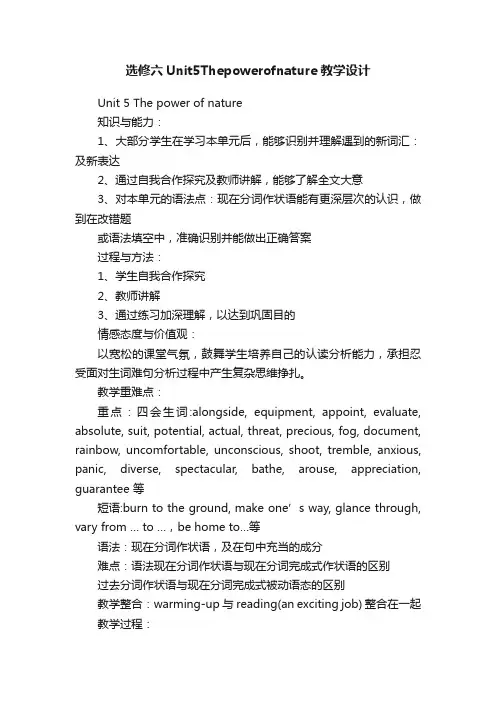
选修六Unit5Thepowerofnature教学设计Unit 5 The power of nature知识与能力:1、大部分学生在学习本单元后,能够识别并理解遇到的新词汇:及新表达2、通过自我合作探究及教师讲解,能够了解全文大意3、对本单元的语法点:现在分词作状语能有更深层次的认识,做到在改错题或语法填空中,准确识别并能做出正确答案过程与方法:1、学生自我合作探究2、教师讲解3、通过练习加深理解,以达到巩固目的情感态度与价值观:以宽松的课堂气氛,鼓舞学生培养自己的认读分析能力,承担忍受面对生词难句分析过程中产生复杂思维挣扎。
教学重难点:重点:四会生词:alongside, equipment, appoint, evaluate, absolute, suit, potential, actual, threat, precious, fog, document, rainbow, uncomfortable, unconscious, shoot, tremble, anxious, panic, diverse, spectacular, bathe, arouse, appreciation, guarantee 等短语:burn to the ground, make one’s way, glance through, vary from … to …,be home to…等语法:现在分词作状语,及在句中充当的成分难点:语法现在分词作状语与现在分词完成式作状语的区别过去分词作状语与现在分词完成式被动语态的区别教学整合:warming-up 与reading(an exciting job) 整合在一起教学过程:The first period:学生自主合作探究,通过阅读,把握全文大意(第一课时)学生活动:学生自主合作探究,通过查看词汇表,查字典,查书后注释,靠自我或小组内成员合作,尽最大力量把握文章大意。
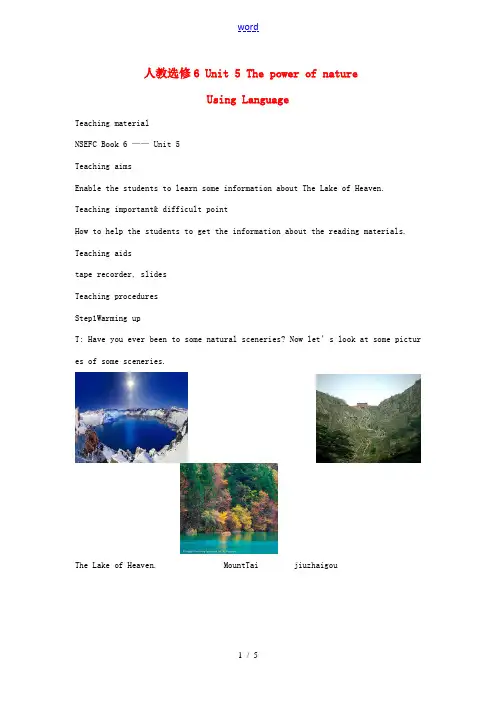
人教选修6 Unit 5 The power of natureUsing LanguageTeaching materialNSEFC Book 6 —— Unit 5Teaching aimsEnable the students to learn some information about The Lake of Heaven. Teaching important& difficult pointHow to help the students to get the information about the reading materials. Teaching aidstape recorder, slidesTeaching proceduresStep1Warming upT: Have you ever been to some natural sceneries? Now let’s look at some pictur es of some sceneries.The Lake of Heaven. MountTai jiuzhaigouMount Huang fuxianhu the west lake Step 2 Fast readingRead the text quickly and find out the key words(关键词) of each paragraph.Paragraph 1 ChangbaishanParagraph 2 TianchiParagraph 3 storiesParagraph 4 coinStep 3 Careful ReadingRead the passage carefully and finish the following tasks.Paragraph 1 ChangbaishanParagraph 2 TianchiParagraph 3 Fill in the blanks with some persons or animals to plete the chart. Three young womenbathingfrom heaven a birdflewThe ManchupeopledroppedfatherfruitA handsomegave birth toboyswallowedThe youngest girlpregnantParagraph 4coinYou and your ______ one drop a ____ into the clear, blue water to ________ your love will be as _____ and _______ as the lake.Keys: loved; coin; guarantee; deep; lastingStep 4 Detailed reading1. In what province is Changbaishan?In Jilin Province.2.What is a nature reserve? Why is Changbaishan a famous nature reserve?A place kept in its natural state for people to enjoy. The largest one in China.3.What is the most popular tourist attraction in the reserve?Tianchi, or the Lake of Heaven.4. What does Tianchi mean? How is Tianchi formed?The Lake of Heaven. In the crater of a dead volcano.5. What is the connection between the Manchu people and Tianchi?The story of the father of Manchu people.Step 5 DiscussionIf you were a tourist guide(导游), how would you introduce the Lake of Heaven in Changbaishan to the tourists?ChangbaishanTianchistorycoinThe Lake of Heavenin its four seasonsSpringsummerautumnwinterStep 6 HomeworkSurf the Internet to find more information about the Lake of Heaven.。
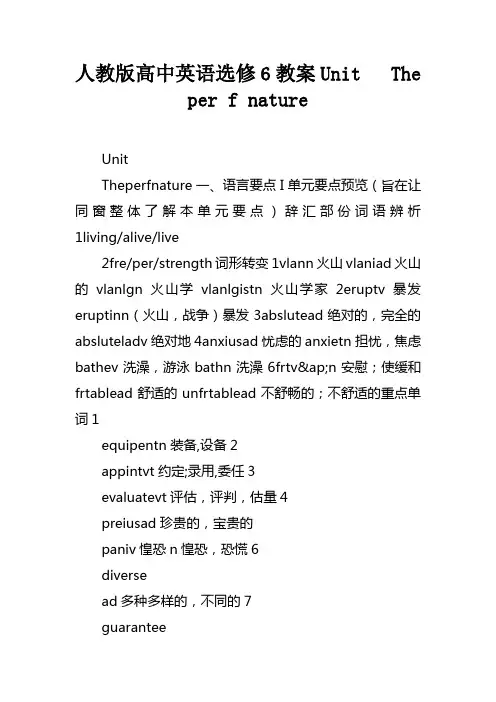
人教版高中英语选修6教案Unit Theper f natureUnitTheperfnature一、语言要点I单元要点预览(旨在让同窗整体了解本单元要点)辞汇部份词语辨析1living/alive/live2fre/per/strength词形转变1vlann火山vlaniad火山的vlanlgn火山学vlanlgistn火山学家2eruptv暴发eruptinn(火山,战争)暴发3abslutead绝对的,完全的absluteladv绝对地4anxiusad忧虑的anxietn担忧,焦虑bathev洗澡,游泳bathn洗澡6frtv≈n安慰;使缓和frtablead舒适的unfrtablead不舒畅的;不舒适的重点单词1equipentn装备,设备2appintvt约定;录用,委任3evaluatevt评估,评判,估量4preiusad珍贵的,宝贵的paniv惶恐n惶恐,恐慌6diversead多种多样的,不同的7guaranteevt保证,担保重点词组pare……ith与……比较burntthegrund全数烧毁aene’sa前去spareneffrt 不遗余力,尽力ipresssbithsth使某人铭刻某事重点句子1Iasabuttgbatsleephensuddenlbedrbeaeasbrightasda 2Itissaidthatthisb,hhadagreatgiftfrlanguagesandpersu asin,isthefatherftheanhupeple重点语法动词形式ing作状语II词语辨析1)living/alive/livead活的【说明】living可作定语又可作表语;可用于指人也可用于指物,指人时可表示“健在”现在指和”死”相对的活着。
alive可作表语,后置定语或补语。
多用于指人,往往指虽有死的可能,但目前仍是活着的,强调“活着的”本身。
live要紧用于指物,表示“活的、有生命的”,还能够表示“实况转播的”。
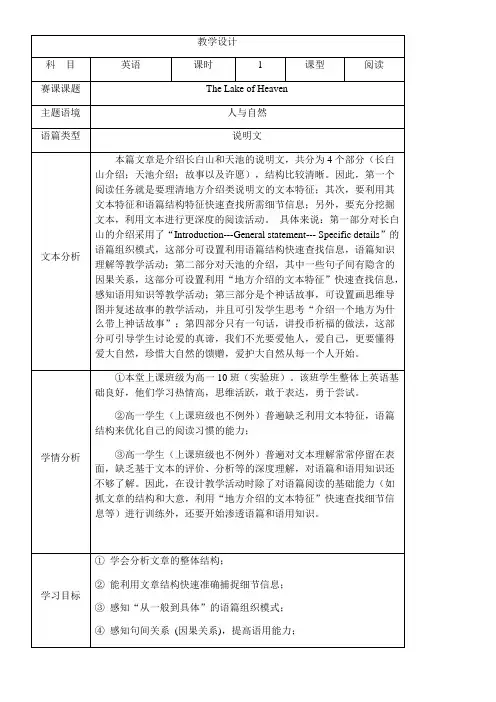
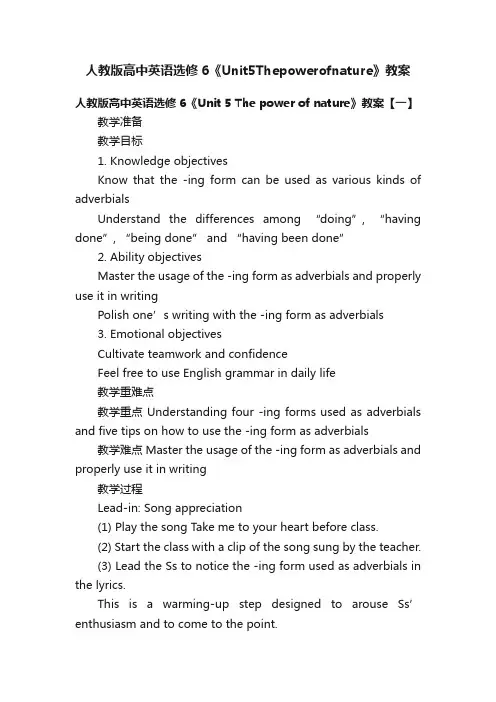
人教版高中英语选修6《Unit5Thepowerofnature》教案人教版高中英语选修6《Unit 5 The power of nature》教案【一】教学准备教学目标1. Knowledge objectivesKnow that the -ing form can be used as various kinds of adverbialsUnderstand the differences among “doing”, “having done”, “being done” and “having been done”2. Ability objectivesMaster the usage of the -ing form as adverbials and properly use it in writingPolish one’s writing with the -ing form as adverbials3. Emotional objectivesCultivate teamwork and confidenceFeel free to use English grammar in daily life教学重难点教学重点 Understanding four -ing forms used as adverbials and five tips on how to use the -ing form as adverbials 教学难点 Master the usage of the -ing form as adverbials and properly use it in writing教学过程Lead-in: Song appreciation(1) Play the song T ake me to your heart before class.(2) Start the class with a clip of the song sung by the teacher.(3) Lead the Ss to notice the -ing form used as adverbials in the lyrics.This is a warming-up step designed to arouse Ss’ enthusiasm and to come to the point.Step 1: We ChooseTask 1: Observe the -ing form in each sentence and decide what it refers to.(reason, result, concession, time, manner, condition)1. Being very rich, he spends as much money as he likes. (reason)2. Working hard, you’ll surely succeed. (condition)3. They sat there, waiting for the beginning of the sports meeting. (manner)4. Walking on the street, he came across a long-lost friend. (time)5. The polar bear was not careful enough, falling on the icy ground. (result)6. Not understanding what you are talking about, I still admire you. (concession)It is intended to remind Ss that the -ing form can be used as various kinds of adverbials. Ask several Ss to answer and, if necessary, interpret the sentences for them with adverbial clauses.Task 2: Check the words in red and decide their relation with the subject and the predicate. (A. active B. passive C. meanwhile D. before-after)Laughing and jumping, he left school.Having finished his homework, he left school.Being talked about at that time, he left school.Having been punished, he left school.First, let Ss choose the correct relation between the -ing form and the subject and that between the -ing form and the predicate in each sentence. Then lead Ss to sum up the differences among “doing”, “having done”, “being done” and “having beendone”.Task 3: Read the sentences aloud and recall the tips.When the reading is finished, ask Ss how to use the -ing form as adverbials.It is intended as a transition from “what” to “how” and the second step is naturally introduced.Step 2: We ChangeTask 1: (Group work) Identify the mistakes in the following sentences and change the sentences into correct ones. Discuss your reason.1. I had a wonderful childhood, travel around the world.2. When crossed the road, you should be careful.3. Having not finished his homework, he was punished by his parents.4. Working hard, your dream will come true.It is aimed to revise the usage of the -ing form as adverbials. By group discussion, Ss may find it easier to solve the problem. Matters such as non-predicate, relation, conjunction, negative words and logical subject are all involved.Task 2: (Pair work) Orally change the adverbial clauses or compound sentences into the -ing form as adverbials.e.g. After we have been informed of Mr. Li’s birthday, we hurried to express our best wishes on the blackboard.(Notice that only the clause part will be changed: predicate→non-predicate)Having been informed of Mr. Li’s birthday, we hurried to……1. Because we hoped to convey our concern for him, we asked Miss Zhu to bring him a card.2. When we danced together, we felt very excited.3. Although we had not met him before, we still treated himas an old friend.4. If you think it over, you will have a good idea.5. She stood on the stage and played with her hair.6. He was so humorous that he made us burst into laughter.It is designed for Ss to put into practice the tips mentioned in the previous task.Step 3: We ChatTask 1: Using the correct form of the given verbs, help me to complete the caption of my moment.Last month, I led my students to join in the oral English competition.(live) far away from the site, we had to get up early in the morning. (not eat) anything before, I felt hungry. As for the students, though tired, they were still enthusiastic about the coming challenge, (talk and laugh) on the bus. When (arrive) at the site, they were very excited.(devote) to practicing before, they did a wonderful job in the competition, (bring) glory to our school. As far as I am concerned, (make) great efforts to practice, any of you can also stand out.It is a revision of the tips mentioned. In addition, it sets an example of how to use the -ing form as adverbials in our daily life.Task 2: Writingo Choose a picture to post.o Write the caption for it.o Try to use the -ing form as adverbials. (3 minutes)Ss are asked to choose a picture from five and write the caption for it by using the -ing form as adverbials in 3 minutes. This is to integrate what has been covered and put it into practice.Task 3: Sharingo Move around the classroom.o Share your moment.o Get “like” or “comment”.(You may also leave your comment when discovering any grammatical mistake.)An example is shown to clarify the instruction. Then Ss are given five minutes to share their moments with their classmates. This is a peer proof-reading activity.Task 4: Presentingo How many“ likes” have you got?o What about “comments”?o Who would like to share with the whole class your moment or the comments you got?This is for several volunteers to present their works and notice the common mistakes when using the -ing form as adverbials.Step 4: SummarySummarize what we have learnt today:o 6 kinds of adverbialso 4 forms of -ingo 5 tipsThis is to remind Ss of what they have learnt today.课后习题Homeworko Review the usage of the –ing form as adverbials.(You may refer to a mini-lecture. )o Polish your caption and share it with your friends.o Finish exercise 3 - 5 on Page 64 of your exercise book.The homework is intended to familiarize Ss with the rules of the -ing form used as adverbials and to develop their writingskills.人教版高中英语选修6《Unit 5 The power of nature》教案【二】教学准备教学目标教学目标:1 深入理解课文,分析文章长难句,培养快速阅读、整体理解和写作的能力。
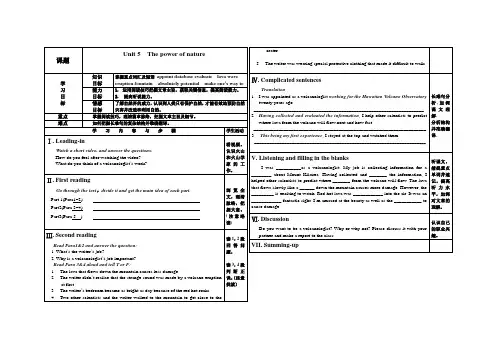
Unit 5The power of naturePeriod 1Warming Up,Pre-reading,Readingand ComprehendingAims:1.To learn about some disasters that are caused by natural forces,how people feel in dangerous situations and the ways in which humans protect themselves from natural disasters.2.To learn how the information is organized.教学过程Step 1Warming up1.Warming up by looking and talkingShow the following pictures to the students and let them know about the power of nature and talk about them.Sample expressions:What happened in the pictures above?Do you know any other natural disasters?Please work with your partners and make a list of natural disasters(such as earthquake,snowstorm,flood,drought).Have you ever seen a volcano?(Some new words:lava erupt/eruption crater active/dormant/extinct volcanoes...)2.Warming up by reading the passage below.Step 2Pre-reading1.Can you imagine climbing into a live volcano in order to measure the temperature of the boiling rock inside?2.Encourage students to talk more about volcanoes by looking at the following pictures.Step 3Reading and comprehending1.Fast-reading:Ask students to skim the passage so as to get the key words and general idea of each paragraph and answer the question:What's the main idea of the text?2.Read the passage carefully and answer the following questions.(1)Why is a volcanologist's job important?(2)Why is the lava that flows on Mount Kilauea more dangerous than the actual eruption?(3)Why was it difficult for the writer to walk towards the edge of the crater?(4)What does the writer find impressive about volcanoes even after studying them for many years?(5)What did the author think it was when an eruption occurred?(6)Why did the scientists look like spacemen?Suggested answers:1.This passage is a first-person account of a volcanologist's experiences.The volcanologist described his exciting job and wrote down his first sight of an eruption.2.(1)Volcanologists study volcanoes so that they can warn people when the volcano is going to erupt and so save many lives.(2)The lava flows down the mountain and can cover up or burn villages in its path.The rocks that erupt from the volcano usually don't damage anything because no one lives near the crater.(3)The author was wearing special protective clothing that made it difficult to walk.(4)The author finds their beauty and their potential to cause great damage very impressive.(5)He thought it was an earthquake.(6)Because they wore white protective suits that covered their whole body.3.Ask students to scan for detailed information and discuss the following question with their partners and be prepared to report to the class.Question:Having learned a little more about the work of a volcanologist,do you think it is an occupation you would enjoy?Give you reasons.Suggested answers:No,I probably wouldn't enjoy this job because I wouldn't have to live in other countries and I don't like being in dangerous situations,either.Above all,I'm not very good at science.ORYes,I'd love to do a job like this because I would enjoy working outside and I think I would enjoy the adventure.It would be exciting to meet people from different countries and I would feel good about helping people avoid danger.Step 4Language studyDealing with any language problem if any(words or sentences students might not understand)to help the students to have a better understanding of the text.Step 5Listening,reading aloud and underliningAsk students to read the passage aloud to the tape and let them pay attention to the pronunciation of each word and the pauses within each sentence.Tell them to pick out all the useful expressions or collocations from the passage while reading and copy them to the notebook after class as homework.Collocations:make one's way,a live volcano,be about to do,look down into,out of the way,be covered with,burn to the ground,attach...to...,compare...with...,run out of Step 6Structure analyzingAfter reading,ask students to discuss the text structure.Keys for reference:This passage is a first-person account of a volcanologist's experiences.The volcanologist described his exciting job and wrote down his first sight of an eruption.The first paragraph introduces the topic and the theme of the text.The rest of the text presents the information in chronological order.A feature of an account of a volcanologist's experiences is the abundance of time expressions.The last sentence of the report functions as a conclusion.In addition,each section begins with a topic sentence.Step 7RetellingAsk students to talk about the volcanologist's experiences in their own words.Give them some key words and expressions.Then let them try to retell the passage.Step 8Homework1.Learn the useful new words and expressions in this part by heart.2.Try to find more pictures showing natural forces and talk about them.Step 9Reflection after teachingPeriod 2Language Study (1)Aims:To get the students to learn to use the following important new words and phrases freely:absolutely,make one's way,alongside,appoint,wave,suit,potential,actual.教学过程Step 1Revision1.Check the homework exercises.2.Ask some students to say something about the power of nature.Step 2Reading and findingGet students to read through Warming Up,Pre-reading,Reading,Comprehending and Learning about Language to underline all the new words and useful expressions or collocations in these parts.Read them aloud and copy them down in the exercise book.Step 3Practice for useful words and expressions1.Turn to Page 36.Go through the exercises in Discovering useful words and expressions with students and make sure they know what to do.2.Give them several minutes to finish the exercises.They first do them individually,and then discuss and check them with their partners.3.Check the answers with the whole class and explain the problems they meet where necessary.Step 4Vocabulary study1.alongside(P34)【原句再现】I travel to unusual places and work alongside people from all over the world.我跑的地方是稀罕奇特的地方,和我一道工作的人来自世界各地。
Period 6 Summing Up,Learning Tip and Assessment整体设计教学内容分析This is the last teaching period of this unit,so the emphasis should be placed on going over and summarizing what has been learned in this unit.It includes the following parts:Summing Up,Learning Tip,Checking Yourself and some other consolidation exercises.Summing Up summarizes the whole unit from the aspects of topics and vocabulary and grammar.The teacher can first use this part to let students sum up what they have learned in this unit and then let them find out what they can't understand very well.Learning Tip gives students instructions on how to get the general idea of the text.Let the students think about what they already know about the topic and what new information they will find.Finally,ask students to finish Checking Yourself on Page 75 in the Workbook.This part aims at encouraging students to make a self-assessment after they finish learning this unit.It is very important to improve their learning.Of course,a testing assessment is also needed.In this period,the teacher can also provide more practice to consolidate what students have learned in this unit.三维目标设计Knowledge and skills1.To get students to master all the useful new words and expressions in this unit.2.To have students grasp the grammar item—the -ing form better,and enable them to use the following structures correctly:“Waking along the street,I met Mary.”and “Having finished my work,I went home.”3.To develop the students' ability of using the important language points in this unit.Process and methodsDesign some additional exercises for students to do in order that they can learn to use and grasp all the contents.Emotion,attitude and value1.To encourage students to learn more about the power of nature.2.To train the students to express their feelings of joy,fear,anxiety and surprise.教学重、难点Using what they have learned in this unit to solve real problems.教学过程Step 1Revision1.Check the homework exercises.2.Dictate some useful new words and expressions in this unit.Step 2Lead-inAsk the students to turn to Page 40.Think about what they have learned in this unit and tick the boxes to see how well and how much they have learned.Step 3Summing upFive minutes for the students to summarize what they have learned in this unit by themselves.Then ask them to write down what they have learned about natural forces.Check andexplain something where necessary.Suggested answers:(Students' answers may vary.)From this unit we have learned some natural forces.From the Workbook we have learned some natural disasters that are caused by natural forces.From this unit you have also learned:useful verbs:appoint,wave,suit,shoot,panic,guarantee,erupt,evaluate,fountain,tremble,sweat,bathephrasal verbs:make one's way,glance through,vary from...to...,burn to the ground,attach... to...,compare...with...,run out of,look down into,take...by surprise,pick up,protect sb./sth.against/from sth.,be covered withuseful nouns:potential,anxiety,diagram,volcano,eruption,ash,hurricane,questionnaire,equipment,database,helmet,boot,candidate,bungalow,typhoon,thunderstorm,novelist,fog,document,rainbow,balcony,shot,appreciationuseful adjectives and adverbs:absolute,actual,anxious,alongside,absolutely,precious,uncomfortable,unconscious,diversegrammar item:the -ing formStep 4PracticeShow the exercises on the screen or give out exercise papers.Ⅰ.Word spelling1.The story ______(使兴奋)the little boy very much.2.On hot days we often go ______(洗澡)in the river.3.I got into a ______(惊慌)when I found the door was locked.4.It was a cold,wet day and the children were b______.5.It's many years since Mount Vesuvius last e______.6.He drew f______ animals with two heads and large wings.7.I'm a______ to get home to open my presents. 8.They had to c______ tomorrow's football match because of the bad weather.Suggested answers:1.excited 2.bathing 3.panic 4.bored 5.erupted 6.fantastic7.anxious8.cancel Ⅱ.Fill in the blanks with the expressions given e each expression only once and make changes where necessary.compare with give birth to look down into make one's way burn to the ground make aneffort out of the way vary from...to...protect...from glance through1.We must ______ to get new knowledge.2.The house was robbed by these cruel guys,and it ______.3.A car accident happened the time I ______ home.4.She could ______ deep greenwoods if she opens her window.5.I ______ the menu and chose a dish which is my sister's favorite.6.Schools have responsibility for ______ students ______ danger.7.The sign tells us to put th e car ______ to make the traffic smoother.8.Their actual needs of energy will ______ person ______ person.9.Mrs Sanders ______ a healthy baby,which made her and her family very happy.Suggested answers:1.make an effort 2.was burned to the ground 3.made my way 4.look down into 5.glanced through 6.protecting;from7.out of the way8.vary from;to9.gave birth toⅢ.Complete the following sentences according to the sample English sentences and the Chinese given.1.Have you ever considered how weak humans are compared with a volcano,hurricane or earthquake?______(和整个世界相比),this area is really small.2.Having collected and evaluated the information,I help other scientists to predict where lava from the volcano will flow next and how fast.______(在伦敦住了五年后),the writer began writing a new detective novel.3.I was about to go back to sleep when suddenly my bedroom became as bright as day.______(Shirley正要离开)when she heard someone knocking at the door.4.The other two climbed down into the crater to collect some lava for later study,but this being my first experience,I stayed at the top and watched them.______(Eric 看着父亲),his face became red.Suggested answers:1.Compared with the whole world 2.Having lived in London for 5 years 3.Shirley was about to leave 4.Eric looking at his fatherⅣ.Multiple choice1.—Did you listen to the lecture?—Yes,I have never heard such a ______ one.A.more exciting B.more excitedC.most exciting D.most excited2.There are so many people that he has to ______ his way through them.A.force B.makeC.take D.get3.______ other good students,the teacher thinks,Hank is ______ student.A.Compared with;a most satisfiedB.Compared to;the most satisfiedC.Compared to;the satisfyingD.Compared with;a more satisfying4.They were ______ their daughter being out so late at night,and very ______ her return.A.anxious for;anxious aboutB.eager for;eager aboutC.anxious about;anxious forD.anxious about;eager about5.The patient was warned ______ oily food after the operation.A.to eat not B.eating notC.not to eat D.not eating6.There are a great ______ flowers shown in the park and ______ people go to have a look.A.plenty of;many B.diversity of;manyC.diverse;many a D.diversity;a few7.The teacher glanced ______ this student who was busy______ a picture.A.to;drawing B.at;drawC.at;drawing D.at;to draw8.It ______ that there will be no war in the world.A.hopes B.is hopingC.hoped D.is hoped9.You've made ______ mistakes in the writing ______ we can't quite catch what you meant.A.such many;s o B.many of;thatC.so many;that D.too many;that10.The football match was said ______ in Rome,but it was held in London at last.A.to have been held B.to be holdingC.to hold D.to have held11.The visiting minister expressed his satisfaction with the talks,______ that he had enjoyed his stay here.A.having added B.to addC.adding D.added12.______ any biscuits that morning,we had nothing to eat.A.Not baking B.Not having bakedC.Not being baked D.Not having been bakedSuggested answers:1~5 AADCC6~10 BCDCA11.C12.BFirst get the students to do the exercises.Then the answers are given.The teacher can give them explanations where necessary.Step 5Learning tipAsk the students to turn to Page 40.Read through the passage and make sure they understand it.Encourage them to do as the passage tells because if they are doing so they will be teaching themselves a useful way of learning.Step 6Assessment1.Checking yourself(on Page 75 in the Workbook)First get the students to think about these questions individually.Then they can discuss in groups sharing their experience.The teacher can join in and give them advice and suggestions where necessary.2.Testing assessmentⅠ.F ill in the blanks with the proper forms of the words given.1.At the moment I saw him ______(cross)the road.2.He went away without saying anything,______(leave)us ______(stand)outside.3.Kate is said ______(design)a new computer program now,but I don't know when she will finish it.4.Do you know the girl ______(lie)under the big tree?5.Many feared that Columbus would fall off the edge of the earth,______(believe)to b e flat.6.The speech which he made ______(concern)the football match bored a lot of fans to death.7.The squirrel was so lucky that it just missed ______(shoot).8.I can hardly imagine Tom ______(sail)across the Atlantic Ocean in five days.9.I would appreciate your ______(call)back this afternoon.10.The discovery of the new evidence led to the thief ______(catch).11.She didn't remember ______(meet)him before.12.We've always deeply regretted ______(sell)the house.13.This dictionary can't help ______(learn)the language.14.—When do you plan to leave?—I mean ______(leave)tomorrow.Suggested answers:1.crossing 2.leaving;standing 3.to be designing 4.lying 5.believed 6.concerning 7.being shot8.sailing9.calling10.being caught11.meeting/having met12.selling/having sold13.(to)learn14.to leaveⅡ.Rewrite the following sentences according to the patterns given.1.A.He always wears sunglasses because sunshine is bad to his eyes.B.He always wears sunglasses to ______ his eyes ______ sunshine.2.A.As soon as the thief saw the policeman,he ran away quickly.B.______ ______ the policeman,the thief ran away quickly.3.A.It's getting late.We should go back to the hotel soon.B.It's getting late.We should ______ ______ ______ to the hotel soon.4.A.If we could all do our best to keep this office tidier,it would help.B.If we could all ______ ______ ______ to keep this office tidier,it would help.5.A.I was just beginning to talk about this question.Just then you interrupted me.B.I was ______ to talk about this question ______ you interrupted me.Suggested answers:1.protect;from 2.Having seen 3.make our way 4.make an effort 5.about;whenStep 7Homework1.Finish off the Workbook exercises.2.Review and summarize what you have learned in Unit 5.Step 8Reflection after teaching________________________________________________________________________ ________________________________________________________________________ ________________________________________________________________________ ________________________________________________________________________。
英语:Unit5《The power of nature》教案(6)(新人教版选修6)The third period Language PointsExplain language points in the reading passage.1. have you ever considered how weak humans are compared with a volcano,hurricane or earthquake ?你是否想过,和火山,飓风或地震相比人类是何等脆弱。
consider 思考, 主要用于:consider +名词/-ing形式:He is considering studying abroad.他正在考虑出国留学。
Consider + wh-:We considered how we should help them.我们仔细考虑应该如何帮助他们。
Consider + 副词:Consider carefully before you decide.要慎重考虑后再作决定。
2. Do you enjoy taking risks ?risk n. 风险,危险:he was taking a risk by overtaking on a bend. 他在转弯处超车是在冒险。
The house is a fire risk. 这房子有起火的危险短语联想:at risk 在危险中:You are at risk if you don’t wear a seat belt. 不系安全带真的会有危险。
at the risk of 冒……危险:At the risk of seeming rude, I must refused your request, I’m afraid.尽管似乎无理,恐怕我还是必须拒绝你的要求。
3.Many houses have been covered with lava or burnt to the ground.许多房屋被熔岩覆盖或烧毁。
Unit5 The power of natureTeaching Content: Unit5 ,Module6 Teaching Class: Class 2, Senior 2Teaching aims:Knowledge:1.Get the students to understand the text fully.2.Get the students to master the power of volcano .Abilities:1. To improve the students’ reading abilities2. To train the students’ abilities of study by themselves .Emotion:1. Enable the student to understand the importance of naturel.2. Put the moral education in the process of studyTeaching important points:1. learn to to get the main idea2. Learn to get the detailed information. Teaching difficult points :How to help the students understand the text fully. Teaching method: cooperative learning, task-based teachingTeaching aids:A computer and a projectorⅤ. Teaching procedure:Step 1. GreetingStep2. Revision1. Review the words and phrases by listening to the tape and repeating.2.Review some natural disasters and get the hangs of volcanoStep3. Read the text carefully and finish reading tasksTask1: Read para1-2 carefully and get the answers1. Why does the writer say that he has the greatest job in the world?2. Why is a volcanologist’s job important?3. Where is Mount Kilauea?Task2: Read para3-4 carefully and answer the fowling questions4. Why is the lava that flows on Mount Kilauea more dangerous thanthe actual eruption?5. What caused the writer’s bedroom to become as bright as dayeven though it was night?6. Why did the scientists have to get close to the volcano after itbegan erupting?7. Why was it difficult for the writer to walk towards the edge of thecrater?Task3: Read para5 carefully and get the answerWhat does the writer find impressive about volcanoes even afterstudying them for many years?Task4:Get the main idea of the text.Step4.SummaryI have the ________ job in the world. I am never _____ with it. Although it is occasionally dangerous, I don’t mind because danger ______ me and makes me feel ____. I think my job is the most __________ because I can help _______ people from danger of volcanoes.I am a ___________ working for HVO. Our work has ______ many lives but unfortunately we can not save their _______. I have ___________ a volcano eruption in Hawaii. I was ____ asleep when my bed began _______ and I heard a _______ sound, like a _____ passing nearby. Then I found my bedroom was as ______ as day, and red lava was ___________ hundreds of meters into the air. The next day, three of us wanted to get close to the ______.We put on _________ suits, ________, big _______ and special ______, which made us look like __________. We slowly _____________ to the edge of the crater to collect some _____ for __________. After studying volcanoes for many years, I am just as ___________ about my job as before. Why? Because of their ________ and their _________ to cause great damage.Step6.Homework1.Finish the exercise on Page352.Try to retell the text。
Unit5 The power of natureI.单元教学目标(技能目标)◆talk about volcanoes and the work of volcanologists◆practice expressing fear and anxiety◆learn the –ing form used as adverbial in a sentence◆write about an experience in a nature disasterII.目标语言1.功能句式: expressing fear and anxiety.◆I was so excited about what I had done and where I was, I forgot my fear.◆I was very worried that…◆I was very relieved when…◆I was trembling almost as much as the ground under my feet.◆I was still terrified.◆I was so nervous that my whole body was damp with sweat.◆I was so anxious that I couldn’t move for a long time.◆I had to force myself not to panic.◆Then I got up the courage to …2.词汇四会词汇:volcano erupt eruption ash hurricane adventure bore excite evaluate unfortunate unfortunately fountain absolute absolutely fantastic crater potential impress precious novelist cancel effort relieve tremble sweat anxiety anxious panic courage typhoon heaven diverse diversity unique bathe swallow guarantee词组:pare …with burn to the ground make an effort make one’s way glance through vary from … to3. 语法:the –ing form used as adverbial in a sentenceLooking carefully at the ground,I made my way to the edge of the crater.Having experienced quite a few earthquakes in Hawaii already, I didn’t take much notice.Period1 Warming up and pre-readingTeaching goals:a.Encourage the students to discuss volcanoes.b.Enable the students to know more about volcanoesTeaching important and difficult points:Talk about volcanoes and the work of volcanologistsTeaching aids:A recorder, a projector, and a puterTeaching methods:Brainstorm and discussion (Group work).Teaching procedures and waysIn order to talk about whatvolcanoes are and how they are formed, students need to learnSome new words: lava erupt/eruption crater active/dormant/extinct volcanoes Step I Show some pictures of disastersAsk student to name disasters as much as they know.Sample answer: cyclone typhoonHurricanetornadosnowstormlandslideV olcanotsunami earthquakefloodhailstormsandstormStep II QuestionsAsk them what they feel when they see the power of nature showing in the pictures:Have you ever experienced one?Share you experience and feelings? (Were you frightened and how frightened were you?)Some expressions tips: scared to death frightened worriedunforgettable unbelievableHave you ever seen a volcano?Ask Ss to plete exercise 1 in groups. Then check their answers orally as awhole class.Ask students to help you make a list of words connected with volcanoesDiscuss with students where in the world active and extinct volcanoes occur.Step III Pre-reading1) Can you tell me who will climb into a livevolcano in order to take the temperature?of the boiling rock inside?volcanologists——do they take up a crazy job?2)get the students to answer the six questions in pre-reading to find out whetherthey willenjoy working as a volcanologist.Students could do this activity as a survey by asking others in their class these questionsOr they could do it individually.3)after they have pleted the task, survey the class to find out how many mightenjoythe work of a volcanologist.their guesses were.Afterthoughts:_____________________________________________________________________ _____________________________________________________________________ _____________________________________________________________________ ______________________________________________________________Period 2Reading and prehendingTeaching goals:a.Enable the students to master some English expressions and phrases and to know someknowledge of volcanoesb.Enable the students to master important pointsTeaching important points:Let Ss learn to use the structures of giving suggestionTeaching methods:Skimming method, Task-based methodTeaching aids:A projector, a tape-recorder and a blackboardTeaching procedures and ways:Step I First readingScanning & skimmingAsk students to read through the passage quickly to get a main idea ofthe whole passage. Give them a limited time to read the whole passagein order to encourage them to practice reading for general ideas and todiscourage them from reading word by wordmain idea: This passage is a first-person account of a volcanologist’s experiences.The volcanologist described his exciting job and wrote down his firstsight of an eruption.What does a volcanologist do ?( answer in the text )Then let students do the multiple-choices (见课件)Set Exercise 1 in“prehending〞either as a group or whole-class activity. Explain to students that the purpose of questions like these is to help themdevelop skills of evaluating a text.Step II Second readingBefore reading, glance through Exercise 2 on Page35.Choose some to ask them and check their answers:1. Why is a volcanologist’s job important?V olcanologists study volcanoes so that they can warn people when the volcano is going to erupt and so save many lives.2. Why is the lava that flows on MountKilauea more dangerous than the actual eruption?The lava flows down the mountain and can cover up or burn villages in its path. the rocks that erupt from the volcano usually don’t damage anything because no one lives the crater.3.Why was it difficult for the writer to walk towards the edge of the crater ?The author was wearing special protective clothing that made it difficultto walk4. What does the writer find impressive about volcanoes even after studying them for 20 years?The author is impressed by the beauty of the eruption and also by its potential to cause great destruction.Step III Third reading (Read again to find more details)1).what made the author realize that an eruption occurred ?answer: my bed began shakinga strange soundmy bedroom became as bright as dayan abosolutely fantastic sightred hot lava was fountaining hundredsof metres into the air2).what did the scientists do after the eruption ?answer: put on white protective suits, helmets, big bootsdropped as closed as possible to the craterslowly make our way to the edge of the craterlooked down into the red boiling centerStep IV HomeworkSpend some time researching one disaster. You can use books, magazines,newspapers or the Internet. Collect pictures and diagram and look for information about:•what causes this kind of disaster•actrual events that happened in the past in china and/or the rest of the world •how people helped the victims•what is being done to prevent the disarster happening again or to lessen the damageAfterthoughts:_____________________________________________________________________ _____________________________________________________________________ ___________________________________________________________________________________________________________________________________Period3-4 Language PointsTeaching Aims1.To learn some new words and phrases.2.To learn some plicated sentence patterns.Teaching Important PointHow to help the students to master the usage of some useful words,expressions and sentences.Teaching Difficult PointHow to enable the students to grasp and remember the detailed information of the reading material.Teaching ProcedureExplain language points in the reading passage.1. have you ever considered how weak humans are pared with a volcano,hurricane or earthquake ?你是否想过,和火山,飓风或地震相比人类是何等脆弱。
Unit 5 The power of nature ( Module 6 )Reading period: An exciting jobTeacher: Students: Time: December 24, 2008Teaching AimsKnowledge aims:1.Get students to use new words and expressions.2.Let students to learn something about volcano and the job of a volcanologist.Ability aims:1.Improve the students’ reading ability.2.Get students to describe their favorite occupations.Emotion aims:1.Get students to know about volcano, and learn about the beauty and power of nature..2.Get students to go for their dreams and make sure their occupation in the future.Teaching important and difficult points:1.Get students to learn about how volcano erupts and the jobs of a volcanologist.2.Translating difficult sentences and learn new expressions in this period.Teaching aids: a computerTeaching time: 45 MinsTeaching procedures:Step1 Brain Storming1.Do you know any natural disasters?2.What do you know about volcano?Step2 Warming up and pre-reading1. A short film about volcanoes.2.Answer “yes” or “no” to the questions to find out i f you would be suitable for a volcanologist. Step3 ReadingSkimming: Please glance through the text as fast as you can and try to find out:1.What is the exciting job according to the text?2.Where is Mount Kilauea?Scanning: Match the main idea of each paragraph.Detail reading: The whole class is divided into 4 groups. Group A read paragraph 1 and finish the related questions. Group B, paragraph 2; Group C, paragraph 3; Group D, paragraph 4and5. Para.11.Does the author love his job? ( three points)2.Replace the underlined parts with a word of similar meaning from Para.1.The car drew up next to the side of our car and the driver waved to us.The factory will greatly increase its products if they have modern machines and tools.Para.21.I was a_____ as a volcanologist working for the HVO twenty years ago.2.Why is a volcanologist’s job important?Para.31.Why is the lava that flows on Mount Kilauea more dangerous than the actual eruption?2.What caused the writer’s bedroom to become as bright as day even though it was night? Para.4 and 51.Why was it difficult for the writer to walk towards the edge of the crater?2.What does the writer impressive about volcanoes even after studying them for many years? Step 4 SummaryWhat’s a volcanologist’s main job?Step 5 DiscussionHaving learned a little more about the work of a volcanologist, do you think it is an occupation you would enjoy? Give your reasons. If not, what’s your favorite occupation? And why?Step 6 Translating for difficult sentences in the text1.Having collected and evaluated the information, I help other scientists to predict where lavafrom the volcano will flow next and how fast.2.I was about to go back to sleep when suddenly my bedroom became as bright as day.3.Having earlier collected special clothes from the observatory, we put them on before we wentany closer.4.The other two climbed down into the crater to collect some lava for later study, but this beingmy first experience, I stayed at the top and watched them.Step 7 Important expressions1.火山爆发 a volcano erupts2.和别人分享你的知识share your knowledge with others3.考虑某事consider sth/that4.和……相比较compare with5.保护人类免受强大的自然力量的袭击protect human being from powerful natural forces6.一座活火山 a live volcano7.测温度,量体温take the temperature of8.适合做某事be suitable for9.被任命为be appointed as10.冒险take risks11.指楼房等被烧毁burn to the ground12.向…..走去/有出息make one’s way to13.正要做某事时…..另一件事发生了 be about to do sth ….when14.注意 take much notice15.在远处 in the distance16.近可能靠近 drop as close as possible17.对…热心;感兴趣 be enthusiastic aboutStep 8 HomeworkA composition: Describe your job in the next ten years.。
矿产资源开发利用方案编写内容要求及审查大纲
矿产资源开发利用方案编写内容要求及《矿产资源开发利用方案》审查大纲一、概述
㈠矿区位置、隶属关系和企业性质。
如为改扩建矿山, 应说明矿山现状、
特点及存在的主要问题。
㈡编制依据
(1简述项目前期工作进展情况及与有关方面对项目的意向性协议情况。
(2 列出开发利用方案编制所依据的主要基础性资料的名称。
如经储量管理部门认定的矿区地质勘探报告、选矿试验报告、加工利用试验报告、工程地质初评资料、矿区水文资料和供水资料等。
对改、扩建矿山应有生产实际资料, 如矿山总平面现状图、矿床开拓系统图、采场现状图和主要采选设备清单等。
二、矿产品需求现状和预测
㈠该矿产在国内需求情况和市场供应情况
1、矿产品现状及加工利用趋向。
2、国内近、远期的需求量及主要销向预测。
㈡产品价格分析
1、国内矿产品价格现状。
2、矿产品价格稳定性及变化趋势。
三、矿产资源概况
㈠矿区总体概况
1、矿区总体规划情况。
2、矿区矿产资源概况。
3、该设计与矿区总体开发的关系。
㈡该设计项目的资源概况
1、矿床地质及构造特征。
2、矿床开采技术条件及水文地质条件。